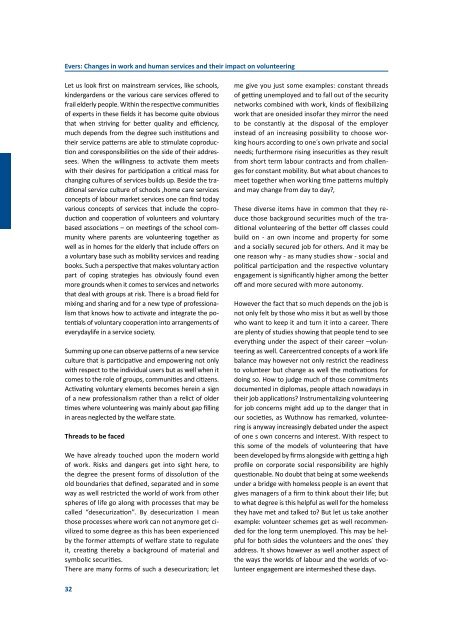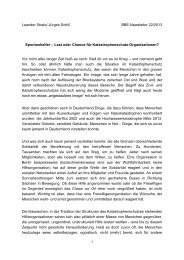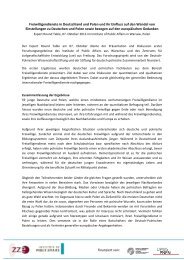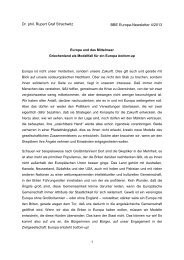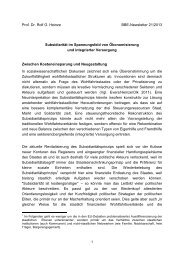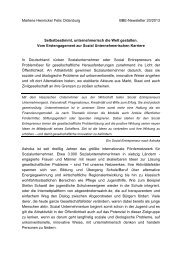ENGAGEMENT UND ERWERBSARBEIT IN EUROPA - BBE
ENGAGEMENT UND ERWERBSARBEIT IN EUROPA - BBE
ENGAGEMENT UND ERWERBSARBEIT IN EUROPA - BBE
Sie wollen auch ein ePaper? Erhöhen Sie die Reichweite Ihrer Titel.
YUMPU macht aus Druck-PDFs automatisch weboptimierte ePaper, die Google liebt.
evers: changes in work and human services and their impact on volunteering<br />
Let us look first on mainstream services, like schools,<br />
kindergardens or the various care services offered to<br />
frail elderly people. Within the respective communities<br />
of experts in these fields it has become quite obvious<br />
that when striving for better quality and efficiency,<br />
much depends from the degree such institutions and<br />
their service patterns are able to stimulate coproduction<br />
and coresponsibilities on the side of their addressees.<br />
When the willingness to activate them meets<br />
with their desires for participation a critical mass for<br />
changing cultures of services builds up. Beside the traditional<br />
service culture of schools ,home care services<br />
concepts of labour market services one can find today<br />
various concepts of services that include the coproduction<br />
and cooperation of volunteers and voluntary<br />
based associations – on meetings of the school community<br />
where parents are volunteering together as<br />
well as in homes for the elderly that include offers on<br />
a voluntary base such as mobility services and reading<br />
books. Such a perspective that makes voluntary action<br />
part of coping strategies has obviously found even<br />
more grounds when it comes to services and networks<br />
that deal with groups at risk. There is a broad field for<br />
mixing and sharing and for a new type of professionalism<br />
that knows how to activate and integrate the potentials<br />
of voluntary cooperation into arrangements of<br />
everydaylife in a service society.<br />
Summing up one can observe patterns of a new service<br />
culture that is participative and empowering not only<br />
with respect to the individual users but as well when it<br />
comes to the role of groups, communities and citizens.<br />
Activating voluntary elements becomes herein a sign<br />
of a new professionalism rather than a relict of older<br />
times where volunteering was mainly about gap filling<br />
in areas neglected by the welfare state.<br />
threads to be faced<br />
We have already touched upon the modern world<br />
of work. Risks and dangers get into sight here, to<br />
the degree the present forms of dissolution of the<br />
old boundaries that defined, separated and in some<br />
way as well restricted the world of work from other<br />
spheres of life go along with processes that may be<br />
called “desecurization”. By desecurization I mean<br />
those processes where work can not anymore get civilized<br />
to some degree as this has been experienced<br />
by the former attempts of welfare state to regulate<br />
it, creating thereby a background of material and<br />
symbolic securities.<br />
There are many forms of such a desecurization; let<br />
32<br />
me give you just some examples: constant threads<br />
of getting unemployed and to fall out of the security<br />
networks combined with work, kinds of flexibilizing<br />
work that are onesided insofar they mirror the need<br />
to be constantly at the disposal of the employer<br />
instead of an increasing possibility to choose working<br />
hours according to one´s own private and social<br />
needs; furthermore rising insecurities as they result<br />
from short term labour contracts and from challenges<br />
for constant mobility. But what about chances to<br />
meet together when working time patterns multiply<br />
and may change from day to day?,<br />
These diverse items have in common that they reduce<br />
those background securities much of the traditional<br />
volunteering of the better off classes could<br />
build on - an own income and property for some<br />
and a socially secured job for others. And it may be<br />
one reason why - as many studies show - social and<br />
political participation and the respective voluntary<br />
engagement is significantly higher among the better<br />
off and more secured with more autonomy.<br />
However the fact that so much depends on the job is<br />
not only felt by those who miss it but as well by those<br />
who want to keep it and turn it into a career. There<br />
are plenty of studies showing that people tend to see<br />
everything under the aspect of their career –volunteering<br />
as well. Careercentred concepts of a work life<br />
balance may however not only restrict the readiness<br />
to volunteer but change as well the motivations for<br />
doing so. How to judge much of those commitments<br />
documented in diplomas, people attach nowadays in<br />
their job applications? Instrumentalizing volunteering<br />
for job concerns might add up to the danger that in<br />
our societies, as Wuthnow has remarked, volunteering<br />
is anyway increasingly debated under the aspect<br />
of one s own concerns and interest. With respect to<br />
this some of the models of volunteering that have<br />
been developed by firms alongside with getting a high<br />
profile on corporate social responsibility are highly<br />
questionable. No doubt that being at some weekends<br />
under a bridge with homeless people is an event that<br />
gives managers of a firm to think about their life; but<br />
to what degree is this helpful as well for the homeless<br />
they have met and talked to? But let us take another<br />
example: volunteer schemes get as well recommended<br />
for the long term unemployed. This may be helpful<br />
for both sides the volunteers and the ones´ they<br />
address. It shows however as well another aspect of<br />
the ways the worlds of labour and the worlds of volunteer<br />
engagement are intermeshed these days.


